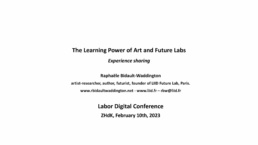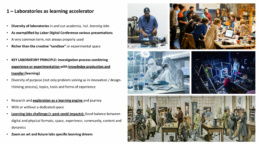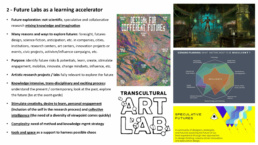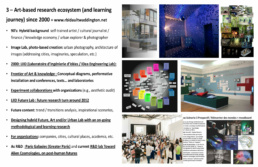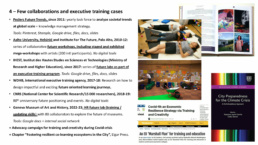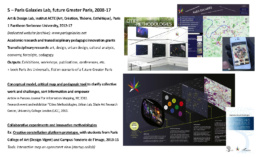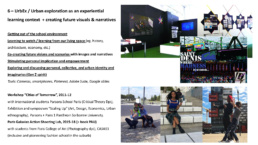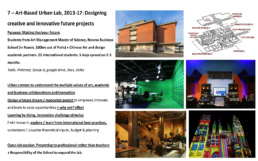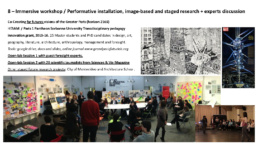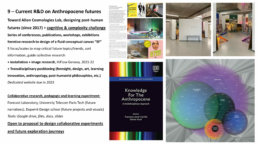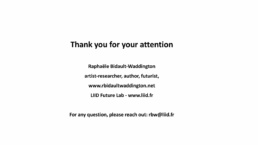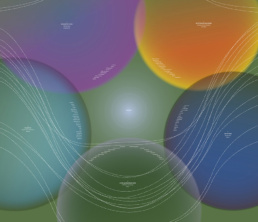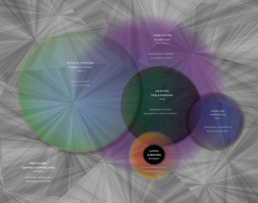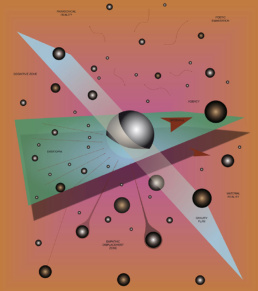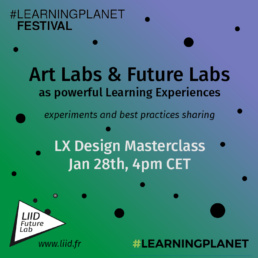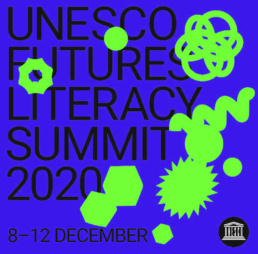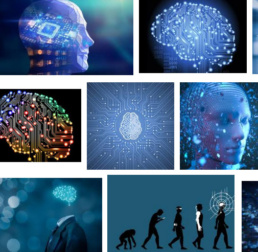Designing Art-Based Future Labs
closing keynote
Labor Digital International Conference, ZhDK (Arts Academy), Zurich, 2023
Dans le cadre de cette conférence à la Haute Ecole des Arts de Zurich, Raphaële Bidault-Waddington est invitée à présenter ses différents laboratoires de recherche artistique et prospective et de montrer comment ils favorisent la production et le partage de connaissance transdisciplinaire, et l’apprentissage par l’investigation et l’expérimentation collaborative.-Son lab de R&D Paris Galaxies sur le Futur du Grand Paris a permis de prototyper de 2012 à 2017 de nombreuses méthodologies, que ce soit par l'image, le récit, le projet ou l'espace de travail - y compris dans l'espace urbain qui devient terrain de jeu et d'apprentissage. A sa suite, TAC Future Lab expérimente depuis 2017 d'autre modalités exploratoires.-L’introduction permet de reformuler une définition de ce qu’est à ses yeux un laboratoire, soit un cadre conceptuel permettant de structurer et faire vivre un processus de recherche autour d’enjeux définis, et selon une diversité de méthodologies et de formats qui peuvent être artistiques, académiques, prospectifs, innovants, ou hybrides.
Presentation
Raphaele Bidault-Waddington, is the founder of LIID Future Lab, a foresight research platform designing future labs in artistic, academic, urban and corporate contexts.
From 2012 to 2017, its multi-awarded lab on the future Greater Paris metropolis (with Paris 1 Pantheon Sorbonne University) prototyped a series of mixed future research and transdisciplinary pedagogic innovations. Its latest R&D lab “Toward Alien Cosmologies” addresses post-human futures and continues innovating at the frontier of future research, art and co-learning.
Interview complémentaire suite à la conférence
What does the format of the lab/laboratory mean to you?
Historically laboratories were specific spaces where to access certain tools, make experiences or design and test experimental protocols in order to extract learnings, to innovate or to produce (scientific and non-scientific) knowledge. The concept of laboratory is in fact rather fluid. In a more recent time, other types of laboratories without specific tools and places, such as learning lab, urban labs, living lab, future lab, art lab, and so on, have emerged. Philosopher Bruno Latour has even introduced the idea that the real world should be the laboratory to learn directly from.
As an alternative definition, in the last twenty years, I have been using the notion of laboratory as a conceptual frame to design, organize and unfold a research process, geared toward a certain critical challenge or topic, and combining experiences or experiments, and learnings (knowledge production and sharing). These learnings can be considered scientific if the lab respect academic rules and protocols, and positions them in relation to a discipline’s state of the art. But they can also be hybrid, peri-scientific or non-scientific when other methods, experiments and knowledge formats are used.
The labs I create as an artist-researcher and future lab designer, always have a speculative dimension, and mix artistic, future, urban and transdisciplinary academic research methods, experiences and formats. Then a laboratory can be very short or very long (from one day to several years), evolve through time (different than a project or a production with a clear expected output), more or less open and collaborative, and involve a small or large number of participants.
What’s your favorite project that explores the future with a lab perspective?
My most thrilling project at the moment is the future lab “Toward Alien Cosmologies” that I started in 2017 to explore Artificial Intelligence future implications, and then expanded to the Anthropocene and post-Truth paradigms, which raise similar holistic future challenges. This lab is my most advanced future research where I’m trying to design new ways of exploring possible future worlds (cosmologies) when everything and at all scales, is radically uncertain.
The Anthropocene requires that we reinvent the way we live on Earth; AI (and technologies) challenges human capacities, certitudes, and politics and raise deep ontological issues; and the post-Truth shakes our relation and trust in any form of truth, as if everything has become somehow alien. This paradigm calls for a profound anthropological and transdisciplinary epistemological reset, which cannot be address with conventional rationality and that’s why and where Art is important. This lab is certainly not reasonable, in all the senses that term can take.
It also echoes post-humanist questions and philosophies as I develop in my article “Designing post-human futures” in Knowledge For the Anthropocene (E. Elgar Press, 2021).
A dedicated website, recollecting all the lab’s research episodes (workshops, exhibitions conferences and publications in France, US, Norway, Germany, Switzerland, etc.) since 2017 is due later this year.
Suite de l’interview sur le site du E-Learning Lab de ZHdK
Slides de l'intervention
A propos de Labor Digital
The conference will explore the questions of which scientific and historical foundations today’s labs are based on. Which exploratory learning and teaching forms, which interdisciplinary methods are lab-specific and what potential does the digital laboratory have for inspired, critical thinking?
Will the learning of the future take place in labs? Can experimental, explorative learning with experts and peers facilitate innovative forms of teaching and learning?
What role does digitality play, and what artistic and design-oriented approaches are we developing in labs? And how can we integrate these methods as small interventions in teaching practice or use them as an entire teaching unit? We will explore these questions analytically and playfully at the LaborDigital conference.
Programme de la conférence : https://paul.zhdk.ch/course/view.php?id=2312#section-2
Compte-rendu de la conférence : https://elearning.zhdk.ch/experience/labordigital-experimental-learnings-an-der-zhdk-1
Rappel des axes de recherche du lab
Axe 1 : Transitions et Mondes Futurs
Axe 2 : Innovation Méthodologie Prospective
Axe 3 : Art et Recherche Prospective
Articles associés à celui-ci
Futurescape : Art x Futur x Learning x IA, ISC Campus, Paris, 2023-24.
Programme d’exploration artistique et prospective sur une année comprenant l’exposition d’une installation interactive,…
limit/no limit, Art & Design Research Conference, Paris, 2024
RBW reparcourt les enjeux liés à la connaissance du TAC Future Lab, que ce soit la valeur cognitive des formats…
Art & Future Research, Alliance for Artistic Research in Universities, USA, 2022
RBW reparcourt le développement de ses laboratoires depuis leur ancrage dans l’héritage de l’art conceptuel et…
Art & Future Labs as LX, Learning Planet Festival, 2022
RBW vient ici partager un large éventail d’expériences de recherche artistiques et prospectives (dont TAC Future Lab),…
Art x Futures, ‘Blended Futures’ Foresight Journal panel, UNESCO FL Summit, 2020
En s’appuyant sur de nombreux exemples internationaux, la présentation repart du fait que les productions artistiques…
Futur x IA x Design Spéculatif, Ecole Duperré, Paris, 2018
Dans ce cycle d’atelier sur le futur de/avec l’IA, les étudiants sont initiés à la recherche par l'image, aux enjeux…
